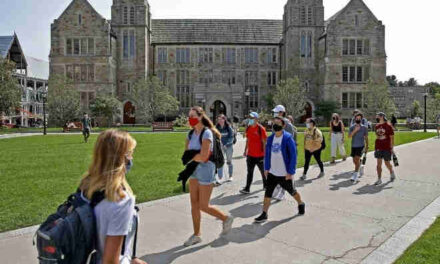Natalie Martini 21′, Managing Editor
For nearly six months, people across America have been adapting to a new routine within their homes. Many have been afraid to return to a regular lifestyle, as they feel it is not yet the time to do so. When schools began opening back up in August 2020, many parents were unsure about sending their children back, and college students had to consider their options. Some were tired of feeling deprived of human interaction and were excited to see their peers again, while others felt it might be a mistake to offer anything but remote learning. When we first heard the news about Immaculata University definitively opening its campus up again in October, many were surprised by this. It is no doubt a difficult decision for the university to make, but it is understandable why people would want to return to campus. If the school ensures everyone’s safety, and other universities have managed toopenwith little consequence, then it’s fair to give students the option to continue their courses in person, especially for those with majors where an online course would inhibit their learning experience. However, for others, it was harder to accept this perspective. Many people argued schools shouldsimply continue online learning, especially when they have the means to do so. It is difficult to understand how some people view the college experience, and how for them, the campus is more than just a campus, but is rather their home.
Soon after students were notified about returning to campus, many professors were more than understanding of those who decided to remain online with their courses. A few of them even expressed their surprise at the University’s decision, and modified their classes to run solely online for the remainder of the semester. For those of us that commute, it may be easier and safer to continue learning remotely, and it’s helpful that we have that option. For some, it has come to be a preferable dynamic to learn remotely, as there is less focus on lecture and more focus on the assignments, allowing students the time to be more thorough in their work. However, it is also important to consider the students who normally live on campus. The decision to return may have been harder for these individuals, as many of them live in another state, rely on campus housing, or prefer it over their current living situation. Some seniors I know have even expressed interest in returning as a resident, but with the wish to continue their classes through virtual learning. This option would ensure that they are able to see roommates or close friends, without requiring that they insert themselves among a classroom of people, thereby limiting their contact with others on campus. This may not be a possible option for students, but many would find it a preferable option if it was.
In considering all of this, it seems we sometimes take for granted our comfort in familiarity, and how our schedules are a massive part of this. During an experience as significant as college, everyone develops a routine that works best for them, and when that routine is compromised due to something as serious as a pandemic, it can be overwhelming to create and learn to adapt to a new one. We all had to rebuild our lifestyles back in March 2020, and in doing so, we lost a sense of comfort that would return indefinitely. Not to mention, we all harbor stress and concern differently in our personal lives, in response to such a drastic, ongoing situation. While it is evident that everyone feels differently about the campus opening, I think it is important to consider the perspectives of all students and faculty, especially for those who rely on the University as more than a school. Everyone has the right to set priorities in their lives, regarding work and school as they see fit. What is most important is that, above these priorities, we continue to consider the health and safety of others.






